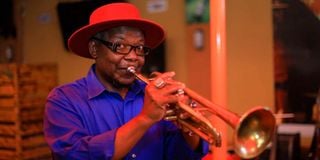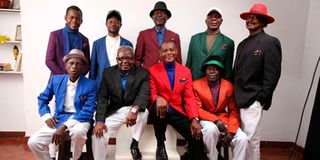Premium
The return of Les Wanyika band

Les Wanyika band leader Sijali Zuwa plays the trumpet during a media briefing.
News of the comeback of the Kings of Rhumba after nearly 24 years has been received with great jubilation. Formed in 1978, the band’s history is intertwined with that of East African music, starting from Tanga, then Arusha in Tanzania before crossing the border to Mombasa and finally Nairobi where the band was formed.
Les Wanyika is simply a name that has been etched even on the minds of those who were too young to see them during their heyday.
About 44 years down the line, hits like Sina Makosa, Afro, Kajituliza Kasuku, Barua, Jessica, and Amigo are key elements of East Africa’s music. Its founding members included drummer Rashid Juma, guitarist Omar Shabani, bassist Tommy Malanga, saxophonist Sijali Salum Zuwa and Phoney Mkwanyule who left Simba Wanyika Band.
Later on, the band leader recruited John Ngereza and vocalist Issa Juma. Of the original founding members, the active ones include band leader and trumpeter Sijali Zuwa and bassist Tommy Malanga.

The current members of Les Wanyika band.
The current ensemble consists of other veteran musicians such as vocalist Rama Kocha, who joined Les Wanyika in 1986, guitarist Tuesday Ogura, a founding member of Maroon Commandos, and drummer Msabaha Zuberi from Tanzania, who has played with Mangelepa.
“Our return is due to public demand. I got so much pressure from fans who insisted that as long as I and Tommy are alive we shouldn’t let the band die,” Sijali Zuwa explained. “The comeback concert is at the County 2 County Grill in Westlands, Nairobi, on Madaraka Day, June 1. It’s a day that will go down in Kenyan and East African history.”
Local club
It all began in Tanga in 1966 when Wilson Kinyonga and George Kinyonga joined Jamuhuri Jazz before leaving in December 1970 to found Arusha Jazz Band. While on tour in Mombasa, the band got a residency at a local club where they changed their name to Simba Wanyika, because they were no longer in Arusha. With time they moved to Nairobi for a residency and it is at that point that Sijali Zuwa joined them at the tender age of 12. Though determined to pursue music in his home country of Tanzania, his parents were vehemently opposed to the idea, sending police to forcefully bring him home every time he came from a show.
While on tour in Kenya with another band, he was spotted by Wilson who recruited him into Simba Wanyika; he first finished his current assignment and returned to Tanzania to officially resign and relocate to Kenya.
“It was an opportunity to run away from home, where pressure to leave music was mounting and I was not going to give up on my dreams. After officially resigning from my band, I took a bus to Nairobi and when I got here, I went to Ambassador Hotel where there was a bar that members of Simba Wanyika would hang out; they have turned the bar into a bakery now.”
From there things were looking up, the band was doing so well that they were living in South C, which in those days was a very posh estate. With weekly performances, recordings, consistent income streaming in and a chance to do what he loves, things were looking up for Zuwa. That was until trouble started to rock the Simba Wanyika boat and they became victims of their own success. Their popularity endeared them to fans of all kinds, some of whom wanted a little more than just a nice performance on stage.
New songs
“Things were great at Simba Wanyika until our band leaders got sugar mummies, and they stopped actively looking for work or pushing for new songs,” Zuwa revealed. We were very young then, and we didn’t want to waste our potential so we left and formed a new group. Our initial thought was to pick the first letters of our names and create a name out of them but it sounded awkward. So we went for Les Wanyika meaning we are half of Wanyika, but it also played well with French speakers because ‘Les’ is ‘the’ in French.”
In November of 1978, history was made when Les Wanyika played for the first time at Garden Square in Nairobi city centre. Owned by Armstrong Kasuku, the joint was a hot spot in its days, with top bands in the country fighting to get a spot.
The popular Les Wanyika song Kajituliza Kasuku is a tribute to the club owner who is touted as a key figure in Kenyan and Urban music business. Though they landed on their feet as far as performance was concerned, recording was not that easy. Simba Wanyika had a record deal with Polygram but they instructed the company not to deal with the new band. Nonetheless they found a work around and recorded the Sina Makosa album which went on to sell in the millions. The song has over the years been reworked by Cool James, Fari Athman, Wyre and Harmonize, just to mention a few. Their Madaraka Day Comeback Concert is a celebration of the resilience and power of East African music and fans are waiting with bated breath.





